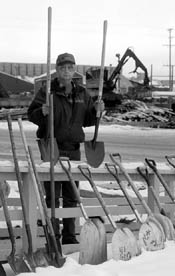|
|
|
| Subscriptions click here for 20% off! | E-Mail: info@rangemagazine.com |
|
|||||||||
HURST OF 10,000
|
|||||||||
| In Eureka, Mont., where the school season would kick off before Labor Day in a football game with the Black Hawks from Seeley Lake, a hazy blue atmosphere drifted from the forest fires raging across the Bitterroots and loafed into the Tobacco Valley like a forgotten shade. | |||||||||
| If 10,000 shovels could have made the difference, Jim Hurst would
have had them on the fireline, but there weren’t 10,000 able bodies
available to man them, not from the small mill towns in the mountains
and not even from all the professionals the government could fly
in from as far away as New Zealand. For now at least, it was enough to hope that the inferno could be kept a smoky 15 miles from either side of town. The football game would be played, and families and fans would sniff the pungent evening air, privately alert to a warmth that might signal it was getting too close. Hurst, 53, was there, watching his son, Jay, play in that season’s first game. It had not occurred to him that he should be anywhere else, and certainly not on the truck dubbed “The Grim Reaper” with all the shovels he donated rolling on to its next destination in Ohio. “Oh, no, no, I’m no hero in this,” said Hurst. “That was just something I felt I had to say after so many years of being silent. I mean, the shovels meant something symbolic between just melting away or doing something.” Hurst’s shovels, collected from hardware stores and suppliers, neighbors, friends and fellow mill owners in Idaho and Montana went first to become the underlying signature of the Jarbidge Shovel Brigade to reopen a remote Nevada road shut down by the U.S. Forest Service. Since then, the shovels, purchased and repurchased by supporters along the way, and most without ever touching dirt, have begun a national odyssey on the 18-wheeler Hurst arranged for the carriage. To many, that was a heroic gesture. To Hurst, it was just time to speak up. His grandparents homesteaded this timbered region only seven miles from the Canadian border, and young Jim worked from timberjacking and topping and onto the sawing floors before he acquired his own mill in Eureka 20 years ago. It was at a time, he knew, when the pressures from environmentalists were beginning to have their effects on the government. He went to meetings with them, tried working with Forest Service people, and joined when other mill workers staged protests in Missoula, but the relentless pressure against harvest didn’t stop. More small mills in the state gave up and were closed. “All I really wanted was to provide some sense of security, as much as you can get in any industry, to the families that worked with us,” Hurst said. “When it began to become impossible, and I had to face those families, I knew I just couldn’t remain silent about it all.” It was litigation that halted timber sales. It was road closures in the national forest. And it was those significantly insignificant pressures on federal attitude toward the people and places he knew. “When I was a kid,” he said, “I used to go into the forest to pick berries. I was never scared, I loved it. Now, I won’t go there without my .357. It’s the grizzlies and the lions. They’re protected. I’m not, except for my sidearm.” He has had to face 20 families dependent on his mill who were left unemployed. He has attended the auction sales of nearby mills that have simply given up. All around his little home town, even across the Canadian border, that late summer, the fires raged. “A guy from a Canadian mill came down to ask me about techniques of harvesting burned timber,” he said without sarcasm. “It was something we used to do, but we can’t anymore. In Canada, the timber is owned by the Province, and they’ve already started work. Here, it’s 15 miles from us and we don’t dare touch it.” Federal authorities, refusing to admit any of their own responsibility for the overgrowth fueling the fires, nevertheless were talking of millions to be spent for “thinning” after it’s over. Maybe that will make a difference in Montana mill towns like Eureka and Seeley Lake, but to Hurst, the only answer is “common sense and just good reason that has been left out of the equation so far.” Where it really counted in the hazy warm evening before the first frost, the Eureka Lions, led by quarterback Jay Hurst, kept it close, but lost their opener to Seeley Lake. Two weeks later, there was another auction of a family owned lumber mill in nearby Olney. It meant another place among the hundreds to be painted on the side of the touring “Grim Reaper” marking the losses of the last 10 years in the Northwest. |
|||||||||
|
Copyright © 1998-2005 RANGE magazine For problems or questions regarding this site, please contact Dolphin Enterprises. last page update: 04.03.05 |
|||

